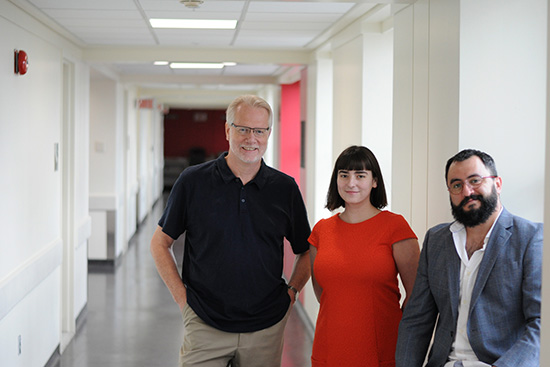Brain’s biological clock stimulates thirst before sleep
The brain’s biological clock stimulates thirst in the hours before sleep, according to a study published in the journal Nature by researchers from the Research Institute of the McGill University Health Centre (RI-MUHC).

The finding – along with the discovery of the molecular process behind it – provides the first insight into how the clock regulates a physiological function. And while the research was conducted in mice, “the findings could point the way toward drugs that target receptors implicated in problems that people experience from shift work or jet lag,” says the study’s senior author, Charles Bourque, a professor in McGill’s Department of Neurology and scientist at the Brain Repair and Integrative Neuroscience Program at the (RI-MUHC).
Scientists knew that rodents show a surge in water intake during the last two hours before sleep. The study by Bourque’s group revealed that this behavior is not motivated by any physiological reason, such as dehydration. So if they don’t need to drink water, why do they?
The team of researchers, which included lead author and Ph.D. student Claire Gizowski, found that restricting the access of mice to water during the surge period resulted in significant dehydration towards the end of the sleep cycle. So the increase in water intake before sleep is a preemptive strike that guards against dehydration and serves to keep the animal healthy and properly hydrated.
Then the researchers looked for the mechanism that sets this thirst response in motion. It’s well established that the brain harbors a hydration sensor with thirst neurons in that sensor organ. So they wondered if the SCN (suprachiasmatic nuclei), the brain region that regulates circadian cycles – a.k.a. the biological clock – could be communicating with the thirst neurons.
The team suspected that vasopressin, a neuropeptide produced by the SCN, might play a critical role. To confirm that, they used so-called “sniffer cells” designed to fluoresce in the presence of vasopressin. When they applied these cells to rodent brain tissue and then electrically stimulated the SCN, Bourque says, “We saw a big increase in the output of the sniffer cells, indicating that vasopressin is being released in that area as a result of stimulating the clock.”
To explore if vasopressin was stimulating thirst neurons, the researchers employed optogenetics, a cutting-edge technique that uses laser light to turn neurons on or off. Using genetically engineered mice whose vasopressin neurons contain a light activated molecule, the researchers were able to show that vasopressin does, indeed, turn on thirst neurons.
“Although this study was performed in rodents, it points toward an explanation as to why we often experience thirst and ingest liquids such as water or milk before bedtime,” Bourque says. “More importantly, this advance in our understanding of how the clock executes a circadian rhythm has applications in situations such as jet lag and shift work. All our organs follow a circadian rhythm, which helps optimize how they function. Shift work forces people out of their natural rhythms, which can have repercussions on health. Knowing how the clock works gives us more potential to actually do something about it.”
About the study
‘Clock-driven vasopressin neurotransmission mediates anticipatory thirst prior to sleep’, by C. Gizowski, C. Zaelzer, and C.W. Bourque is published in Nature, doi:10.1038/nature19756
This research was supported by the Canadian Institutes of Health Research and the Fonds de Recherche du Québec - Santé.
About the RI-MUHC
The Research Institute of the McGill University Health Centre (RI-MUHC) is a world-renowned biomedical and healthcare research centre. The Institute, which is affiliated with the Faculty of Medicine of McGill University, is the research arm of the McGill University Health Centre (MUHC) – an academic health centre located in Montreal, Canada, that has a mandate to focus on complex care within its community. The RI-MUHC supports over 460 researchers and close to 1,300 research trainees devoted to a broad spectrum of fundamental, clinical and health outcomes research at the Glen and the Montreal General Hospital sites of the MUHC. Its research facilities offer a dynamic multidisciplinary environment that fosters collaboration and leverages discovery aimed at improving the health of individual patients across their lifespan. The RI-MUHC is supported in part by the Fonds de recherche du Québec – Santé (FRQS). rimuhc.ca
Media contact
Valérie Harvey
Public Affairs & Strategic planning
McGill University Health Centre
514 934-1934 ext. 71381
[email protected]
Cynthia Lee
Media Relations
McGill University
Tél. : 514 398-6754
[email protected]


